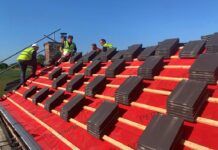The Construction Industry Coronavirus (CICV) Forum is providing greater visibility on what constitutes ‘essential work’ to prevent key workers being harassed and verbally abused during vital construction projects.
The Forum’s members have reported an increasing number of tradespeople being intimidated and verbally abused by the public, while carrying out legitimate projects in line with CICV Forum guidelines.
To try and diffuse the situation, the Forum has produced a checklist of projects to help the public understand the range of work classified as ‘essential’. It also plans to offer on-site signage to help workers make it clear to the public they are carrying out essential work only.
Kevin Stewart, Minister for Local Government, Housing and Planning, said such measures were essential to provide clarity and reduce tension between the wider public and workers.
He said: “The general public may not be aware of the full range of projects that constitute ‘essential work’, but these are workers who are performing a vital role safely and responsibly.
“At a time when the Scottish government is asking people to remain in their homes, it is even more important that these homes are watertight, safe and have essential working facilities, such as water, gas and electricity.
“Builders and plumbers’ merchants are also needed to provide supplies for essential repair and maintenance, such as heating and hot water breakdowns, roofing repairs, and electrical and fire safety.”
Kevin added: “It is important that the public understand that there is still a need for essential works to be carried out in these challenging times, and industry professionals should be able to complete repairs in safety, without fear of criticism and rebuke.”
His words were echoed by John McKinney, secretary of Forum members the National Federation of Roofing Contractors, the Stone Federation and the Scottish Contractors Group, who said: “Essential construction work is not confined to building a major hospital for COVID-19, but we know that people might not be aware of this.
“There are dozens of other construction works that are classed as essential to keep the fabric of Scotland intact. At the very least, homes need to be watertight and safe, both inside and out, for people to be able to live in them. That’s why the construction industry is working hard across Scotland to ensure people can stay at home during these times to protect the NHS.
“Greater understanding is needed among the public to understand that the key workers carrying out such work aren’t flouting the rules – they are performing essential tasks and should be allowed to do so without fear of abuse.”
To help the public, the Forum has now compiled a list of essential work that is permitted to be carried out, including:
- Removal of elements in danger of collapse, e.g. cladding
- Repair and construction of critical road and utility infrastructure
- Emergency call-out services, e.g. electrical, plumbing, glazing and roofing
- Making inhabited buildings safe and watertight, e.g. after storm damage
- Domestic repairs to ensure occupants’ safety and wellbeing, e.g. the elderly
- Repair and maintenance of essential buildings, e.g. fire and police stations
- Safe operation of faulty heating and water systems
- Essential inspections to prevent health outbreaks, e.g. legionnaires
- Supply of materials for these and other essential COVID-19 projects.
In addition, the Forum is developing a series of free signage for contractors to use to make it clear that any work being carried out is essential.
Designed to be printed out and inserted in van windows and properties, they read: “Key Worker: Carrying Out Essential Construction Work.”




